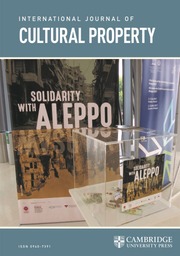Article contents
Thinking in terms of law and mortality
Published online by Cambridge University Press: 18 February 2005
Extract
The author lays a blueprint for distinctions between legal and moral rules and socially accepted behavior, situations in which these distinctions set different standards of conduct, and the relationship among them. Several of the more common paradigms of cultural property disputes are then fit into the patterns of legal and moral rules and obligations, thus establishing a framework for the discussion of how to evaluate ethical or moral behaviors in varying circumstances. The author also considers the relevance of deontological and consequentialist arguments for the return of cultural property, as well as avoidance strategies by which a country of origin can make a claim for restitution while ignoring the long-term questions of the legitimacy, power, and responsibilities of national governments. The author concludes by emphasizing the difficulties in basing arguments concerning cultural property on moral evaluations and conclusions.
- Type
- Research Article
- Information
- Copyright
- © The International Cultural Property Society
- 1
- Cited by


